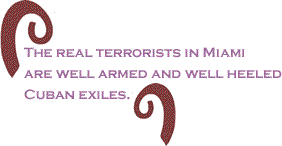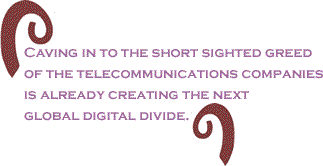
|
|||||||||||||||||||||
 |
|||||||||||||||||||||
 |
|||||||||||||||||||||
 |
|||||||||||||||||||||
 |
|
|
|
|
A new hue has been added to the list of America’s
color coded “terrorist alerts.” It’s black. As last week’s BC
cover story pointed out, the indictment of seven black Miami residents
for allegedly conspiring to blow up the Sears Tower and according
to US Attorney General Alberto Gonzalez wage a “full ground war”
against the United States was a sort of homecoming reunion between
the racist demonizations of foreigners as “terrorists” and traditional
American invocations of the black boogeyman in political season. No reasonable person doubts that Miami is the terrorist
capital of North America. But its resident and reigning terrorists
are not indigent black dreamers dependent on helpful federal agents
to furnish them with boots and rental cars to case their purported
targets. The real terrorists in Miami are well armed and well heeled
Cuban exiles, responsible for hundreds of murderous provocations
over the last four decades, and endorsed by every president, Republican
and Democrat alike over that time. Orlando Bosch, one of the principals
involved in the 1976 bombing
of a Cuban airliner with 73 innocent civilians aboard, including
Cuba’s entire Olympic fencing team lives openly in Miami after receiving
a presidential pardon
from the first President George Bush. Hundreds of other local residents are active participants
in dozens of organizations which make up the logistic, financial
and political sinews of these officially tolerated terrorist networks.
And make no mistake about it, these networks are officially tolerated
because their targets are Cuban civilians, leftish dissenters within
the Cuban American community and the occasional outsourced mercenary
gig. Luis Carilles Posada, who the FBI has also linked to the deadly
bombing of the Cuban airliner, also boasts of having a hand in the
Washington DC assassinations of former Chilean ambassador to the
US and his American co-worker. In the 1990s, loyal Cubans infiltrated some of these
networks. They succeeded in gathering information which enabled
the Cuban government to thwart several bombings and attacks on lives
and property in Cuba. By 1998, on their own initiative, they contacted
the FBI to share the fruits of their investigations, including evidence
that US based terrorists had violated and conspired to violate numerous
US and As in the case of Mumia Abu Jamal, after whom the
street leading to France's largest sports stadium is named, parliamentarians
in other countries regularly pass resolutions and appeals to US
authorities to reconsider or pardon the Cuban Five. The view from
outside the reality-distorting US media bubble is apparently much
clearer. Dot, a BC reader opines: I don't know all that you do about the guys in Miami, as you have probably looked into who they were and what they were really up to. All I know is what I saw on TV and it was clear that bust was bogus. That is one reason the story did not hang around on the TV for very long. It was entirely too ridiculous for even the corporate media to swallow and regurgitate. No one, but the dumbest of red-necks and brain-dead Bush followers, believes that the men we saw on TV were the slightest danger to the Sears Tower. The whole story stunk to high heavens. Reminds me a little of the anthrax attacks. So if you’re young and black, and dumb enough to murdermouth
in the presence of federal agents in an election year, you will
be a poster boy for the administration’s never ending war on terror
and in line to receive up to 75 years in prison. If you expose
real terrorists operating from American soil you could get life
or double life. But if you’re a real, live rocket launching, hotel
bombing, civilian killing Miami-based terrorist you get what? A
Bush presidential pardon, a big house and an OK life. The Next Digital Divide
The next digital divide won't be between well to do
Americans who can afford broadband and those who cannot. It will
be between the US, where the Internet backbones are privately owned
and moderately fast access is delivered only to those who can pay
premium prices, and advanced nations like France, Japan and South
Korea where universal access to broadband is public policy. Back in the 1980s cable companies promised universal
access for every household in the nation, 500-plus channels including
plenty of community based and educational TV programming, multiple
cable providers to choose from in every market and low, low rates
in return for access to the public rights of way, big subsidies
and tax breaks, and regulations that prevented the emergence of
any competition. They pocketed the subsidies and tax breaks. They
balked at delivering any service at all to poorer areas, and forced
communities to fight tooth and nail for severely limited community
and public access programming, and maintained monopolies or duopolies
in every market. After spending billions of federal dollars developing
the Internet the government sold its backbones to telco corporations
for a song. The telcos promised universal high speed broadband
access for every school classroom in America early in the first
decade of the 21st century. They were granted enormous subsides,
colossal tax breaks, and allowed to charge ratepayers the highest
phone and Internet bills on the planet to finance the wiring of
every school, home and business in the nation with fiber optic cable,
and to develop and implement the new technologies that would have
made this possible. Like their cable cousins, the phone companies
lied about their intentions, put the subsides, tax breaks and higher
phone bills in their pockets and did not deliver. The inherent limitations in the speed and versatility
of DSL technology, which allowed delivery of a relatively slow and
limited version of broadband, were well known in the late 1980s
and early 1990s. But foisting DSL on American consumers let them
put the hundreds of billions in tax breaks, subsidies and extra-high
rates they received to rewire the national information infrastructure
into corporate pockets. Hence the US now offers the slowest Internet
service in the industrialized world to the smallest cross section
of its population. We are 16th in broadband household penetration,
behind Japan, South Korea and all of Western Europe, according to
Dr. Lawrence Lessig
of Stanford's Center for Internet and Society, and between 12th
and 19th and falling in the cost per megabit/second of broadband
access. When Internet speeds of 1000 megabits per second are
delivered to homes, schools and commercial users, it turns out this
is the most efficient way to deliver hundreds of channels of cable
TV, multimode teleconferencing, and phone service to end users,
with space left over for other applications we cannot even imagine.
Singapore and South Korea will be the first to deliver such service
to their populations, before the end of the decade. “Fast” broadband
access in major US cities is presently only 1.5 megabits per second
for downloads and a fraction of that for uploads. The cutting edges
of innovation and development of new products and services deliverable
over 21st century digital networks are fleeing the US for Europe
and Asia, where high throughput speeds and universal access are
the rule. Caving in to the short sighted greed of the telecommunications
companies is already creating the next global digital divide, and
US citizens and businesses are on the short side of this one.
The Internet was developed with public dollars. Its
inherent possibilities for commerce, for education, and for community
itself are a public good for the public to determine, the common
property and responsibility of all. But this is called a capitalist
system for good reason. The voices of the owners of invested capital
are louder in the ears of the US House and Senate than those of
the people. The telecommunications corporations may have more lobbyists
in DC than there are members of Congress, and are spending tens
of millions per month in advertising, wining and dining key legislators
over and above the other tens of millions they have forked out in
campaign and charitable contributions. The fact that US Senate's Commerce Committee split
on network neutrality 11 for to 11 against, in spite of the unprecedented
full court press against network neutrality, and in the complete
absence of coverage of the issue in the mainstream news speaks to
the power of public opinion focused upon them thus far. If readers
have already visited savetheinternet.com,
if you have already signed the petition and contacted your member
of the House when the COPE bill was being considered there, it is
now time to contact both your state's members of the US Senate,
and tell them how important this is to you. In a foretaste of what's coming for US ratepayers
when network neutrality ends, the Canadian phone monopoly is adding
a 25% tax for users of Vonage, a popular service that routes long
distance phone calls over the Internet. The telco argument is that
the tax is needed to make up for the cost of guaranteeing the quality
of service Vonage needs to operate. But in fact, it is as simple
and blatant an act of piracy as one of those armed roadblocks you
see in so-called “failed states” where thugs with guns peer into
your car and demand you give them something in order to pass on
your way. This is where the unencumbered rule of greedy corporations
leads. Not to competition, creativity and innovation, but to Internet
roadblocks and simple piracy. Posting and viewing your wedding or family reunion
pictures, using the Internet as a tool to get the local and international
news you won't see on TV, or to get the word out in your town about
local happenings, to create and share content, to download and sample
music – all this will be in the past if network neutrality goes
down the drain. Even folks who use low cost long distance phone
cards will see these services disappear if network neutrality is
not enforced by law. If the US Senate and House do nothing, FCC
rulings have already granted phone and cable companies the right
to restrict traffic any way they see fit over the parts of the Internet
they control. The train is moving up the track. But it still can
be stopped. It's up to us. BC Editor Bruce Dixon is available
at [email protected]. |
|
| Home | |
Your comments are always welcome. Visit the Contact Us page to send e-Mail or Feedback or Click here to send e-Mail to [email protected] e-Mail re-print notice
If you send us an e-Mail message we may publish all or part of it, unless you tell us it is not for publication. You may also request that we withhold your name. Thank you very much for your readership. |
|
| July 6, 2006 Issue 190 |
||||||||||||||
|
||||||||||||||
|
||||||||||||||
| Printer Friendly Version in resizeable plain text format | ||||||||||||||
 |
||||||||||||||
 |
||||||||||||||
 |
||||||||||||||
 |
||||||||||||||
| |
||||||||||||||
| |
||||||||||||||





























